BA (Hons) Hospitality Management: Strategic Planning Report Analysis
VerifiedAdded on 2023/01/18
|13
|3996
|54
Report
AI Summary
This report provides a comprehensive analysis of strategic planning within the hospitality industry, focusing on Denbies Wine Estate Hotel as a case study. It begins by critically analyzing factors affecting the successful implementation of strategies across key business functions, including leadership, structural design, information and control systems, and human resources. The report then delves into the evaluation of different performance metrics, such as Critical Success Factors (CSFs) like carbon neutrality and profitability, and Key Performance Indicators (KPIs) like sales and employee satisfaction. The analysis assesses how these metrics relate to and impact the effectiveness of the implemented strategies. Finally, the report critically evaluates key elements in managing strategic change and leading types within the context of the hospitality sector, providing a holistic view of strategic planning and its practical application.
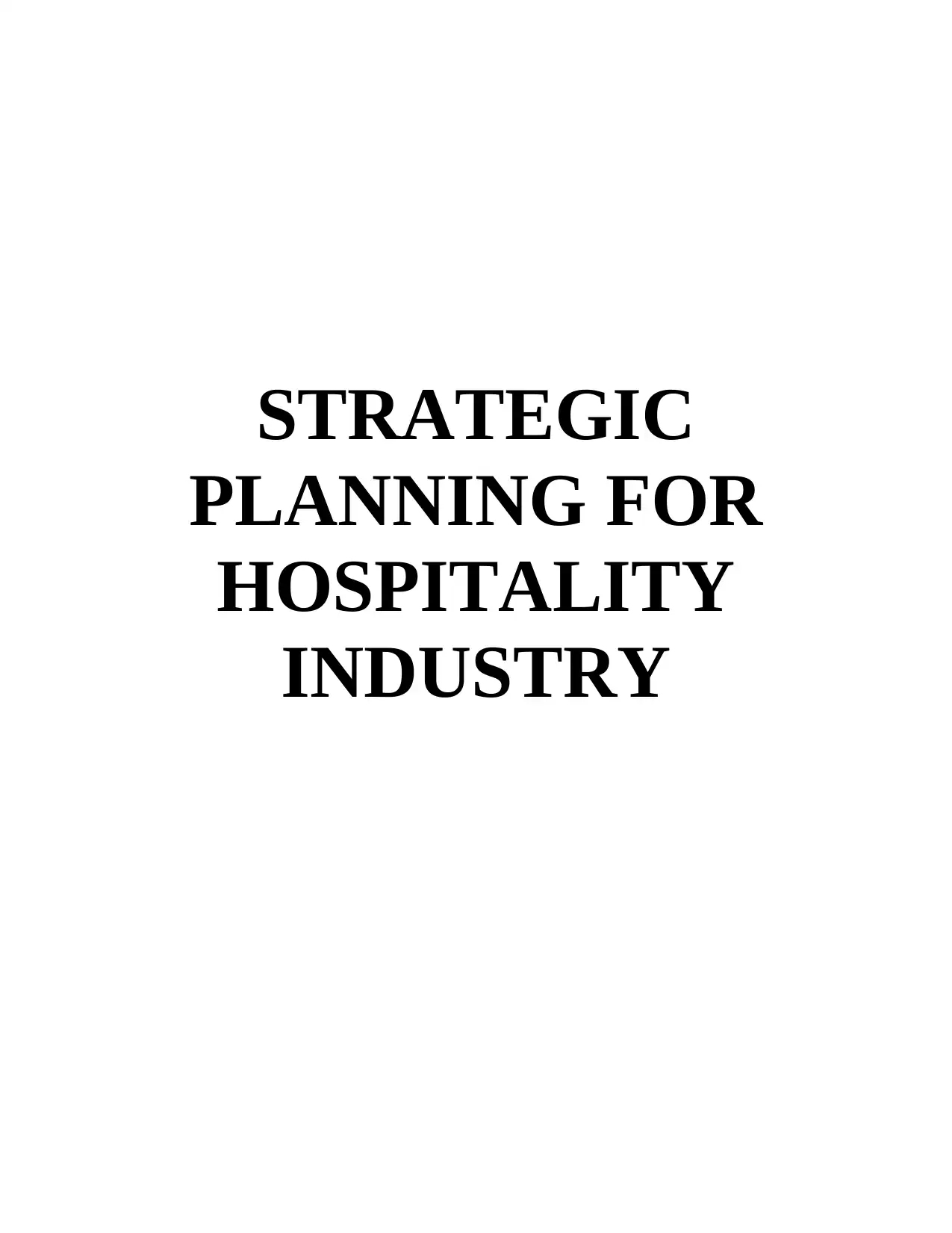
STRATEGIC
PLANNING FOR
HOSPITALITY
INDUSTRY
PLANNING FOR
HOSPITALITY
INDUSTRY
Paraphrase This Document
Need a fresh take? Get an instant paraphrase of this document with our AI Paraphraser
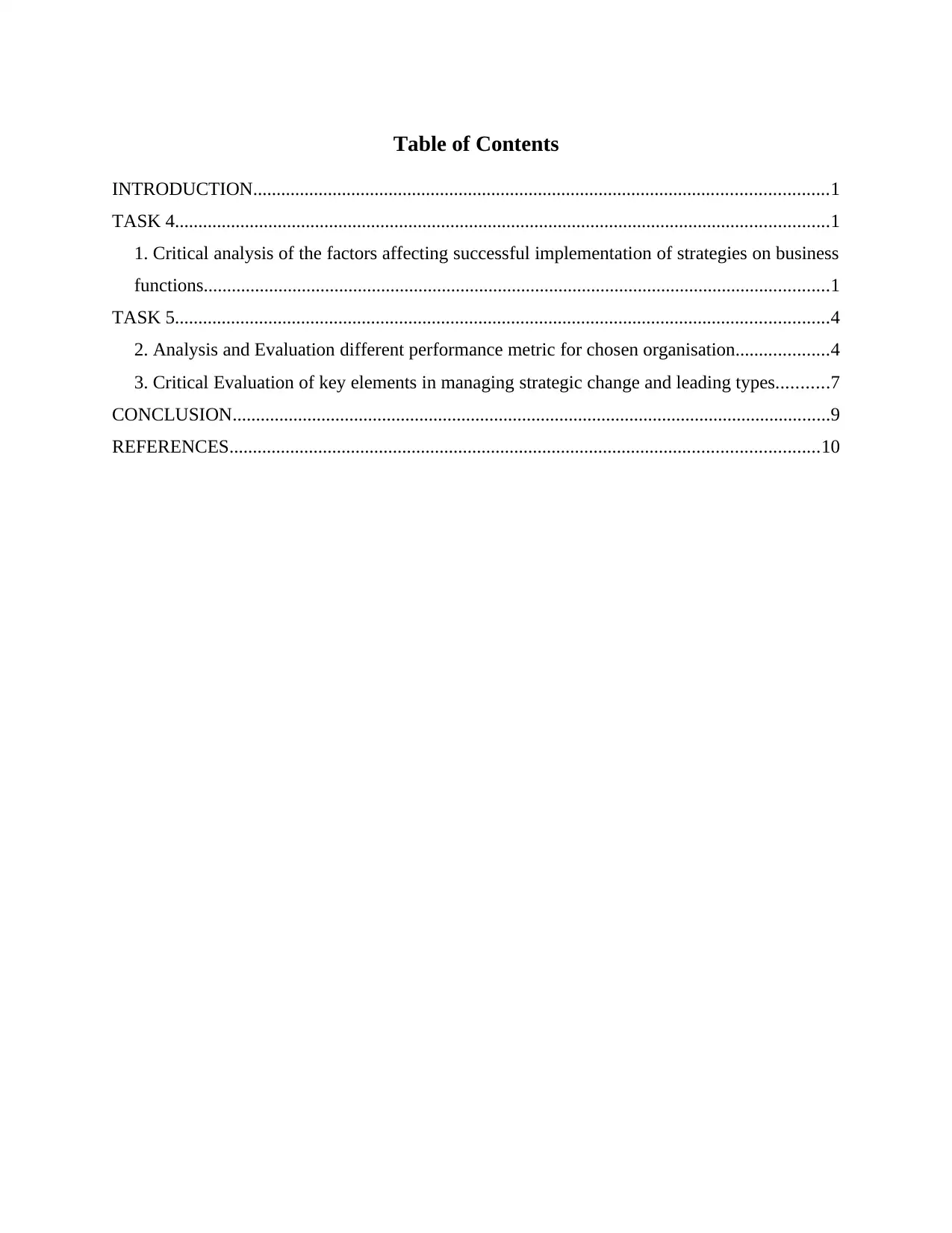
Table of Contents
INTRODUCTION...........................................................................................................................1
TASK 4............................................................................................................................................1
1. Critical analysis of the factors affecting successful implementation of strategies on business
functions......................................................................................................................................1
TASK 5............................................................................................................................................4
2. Analysis and Evaluation different performance metric for chosen organisation....................4
3. Critical Evaluation of key elements in managing strategic change and leading types...........7
CONCLUSION................................................................................................................................9
REFERENCES..............................................................................................................................10
INTRODUCTION...........................................................................................................................1
TASK 4............................................................................................................................................1
1. Critical analysis of the factors affecting successful implementation of strategies on business
functions......................................................................................................................................1
TASK 5............................................................................................................................................4
2. Analysis and Evaluation different performance metric for chosen organisation....................4
3. Critical Evaluation of key elements in managing strategic change and leading types...........7
CONCLUSION................................................................................................................................9
REFERENCES..............................................................................................................................10
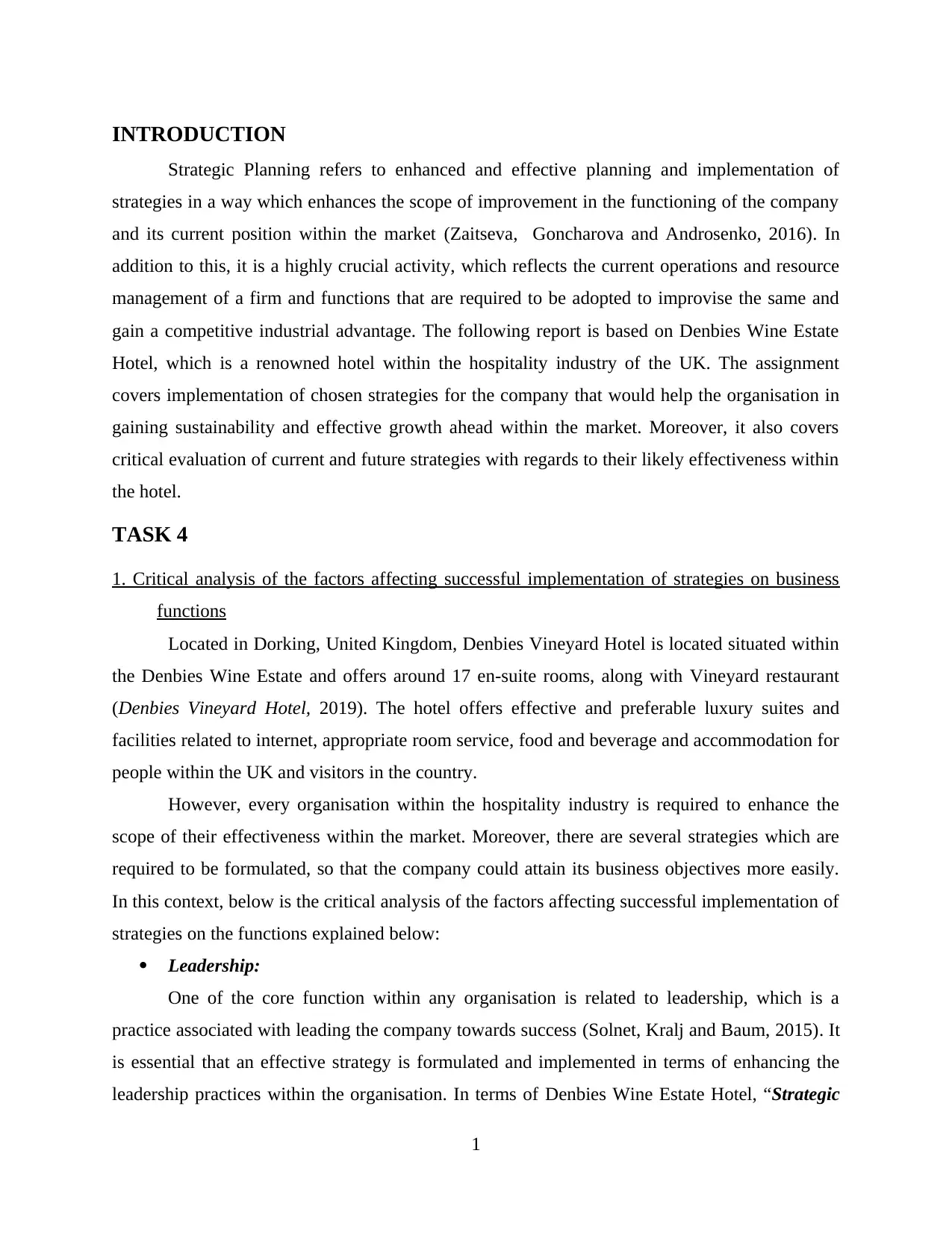
INTRODUCTION
Strategic Planning refers to enhanced and effective planning and implementation of
strategies in a way which enhances the scope of improvement in the functioning of the company
and its current position within the market (Zaitseva, Goncharova and Androsenko, 2016). In
addition to this, it is a highly crucial activity, which reflects the current operations and resource
management of a firm and functions that are required to be adopted to improvise the same and
gain a competitive industrial advantage. The following report is based on Denbies Wine Estate
Hotel, which is a renowned hotel within the hospitality industry of the UK. The assignment
covers implementation of chosen strategies for the company that would help the organisation in
gaining sustainability and effective growth ahead within the market. Moreover, it also covers
critical evaluation of current and future strategies with regards to their likely effectiveness within
the hotel.
TASK 4
1. Critical analysis of the factors affecting successful implementation of strategies on business
functions
Located in Dorking, United Kingdom, Denbies Vineyard Hotel is located situated within
the Denbies Wine Estate and offers around 17 en-suite rooms, along with Vineyard restaurant
(Denbies Vineyard Hotel, 2019). The hotel offers effective and preferable luxury suites and
facilities related to internet, appropriate room service, food and beverage and accommodation for
people within the UK and visitors in the country.
However, every organisation within the hospitality industry is required to enhance the
scope of their effectiveness within the market. Moreover, there are several strategies which are
required to be formulated, so that the company could attain its business objectives more easily.
In this context, below is the critical analysis of the factors affecting successful implementation of
strategies on the functions explained below:
Leadership:
One of the core function within any organisation is related to leadership, which is a
practice associated with leading the company towards success (Solnet, Kralj and Baum, 2015). It
is essential that an effective strategy is formulated and implemented in terms of enhancing the
leadership practices within the organisation. In terms of Denbies Wine Estate Hotel, “Strategic
1
Strategic Planning refers to enhanced and effective planning and implementation of
strategies in a way which enhances the scope of improvement in the functioning of the company
and its current position within the market (Zaitseva, Goncharova and Androsenko, 2016). In
addition to this, it is a highly crucial activity, which reflects the current operations and resource
management of a firm and functions that are required to be adopted to improvise the same and
gain a competitive industrial advantage. The following report is based on Denbies Wine Estate
Hotel, which is a renowned hotel within the hospitality industry of the UK. The assignment
covers implementation of chosen strategies for the company that would help the organisation in
gaining sustainability and effective growth ahead within the market. Moreover, it also covers
critical evaluation of current and future strategies with regards to their likely effectiveness within
the hotel.
TASK 4
1. Critical analysis of the factors affecting successful implementation of strategies on business
functions
Located in Dorking, United Kingdom, Denbies Vineyard Hotel is located situated within
the Denbies Wine Estate and offers around 17 en-suite rooms, along with Vineyard restaurant
(Denbies Vineyard Hotel, 2019). The hotel offers effective and preferable luxury suites and
facilities related to internet, appropriate room service, food and beverage and accommodation for
people within the UK and visitors in the country.
However, every organisation within the hospitality industry is required to enhance the
scope of their effectiveness within the market. Moreover, there are several strategies which are
required to be formulated, so that the company could attain its business objectives more easily.
In this context, below is the critical analysis of the factors affecting successful implementation of
strategies on the functions explained below:
Leadership:
One of the core function within any organisation is related to leadership, which is a
practice associated with leading the company towards success (Solnet, Kralj and Baum, 2015). It
is essential that an effective strategy is formulated and implemented in terms of enhancing the
leadership practices within the organisation. In terms of Denbies Wine Estate Hotel, “Strategic
1
⊘ This is a preview!⊘
Do you want full access?
Subscribe today to unlock all pages.

Trusted by 1+ million students worldwide
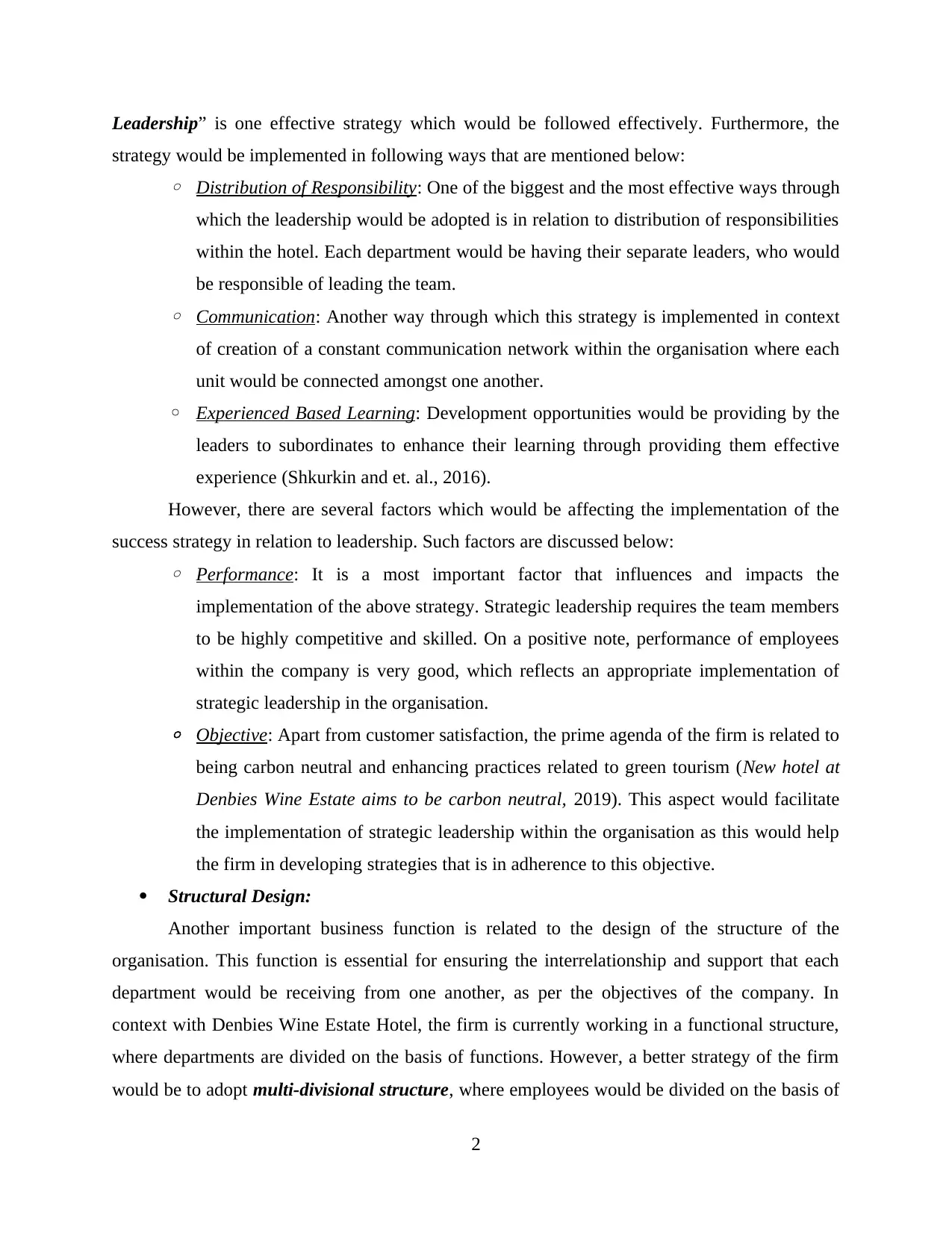
Leadership” is one effective strategy which would be followed effectively. Furthermore, the
strategy would be implemented in following ways that are mentioned below:
◦ Distribution of Responsibility: One of the biggest and the most effective ways through
which the leadership would be adopted is in relation to distribution of responsibilities
within the hotel. Each department would be having their separate leaders, who would
be responsible of leading the team.
◦ Communication: Another way through which this strategy is implemented in context
of creation of a constant communication network within the organisation where each
unit would be connected amongst one another.
◦ Experienced Based Learning: Development opportunities would be providing by the
leaders to subordinates to enhance their learning through providing them effective
experience (Shkurkin and et. al., 2016).
However, there are several factors which would be affecting the implementation of the
success strategy in relation to leadership. Such factors are discussed below:
◦ Performance: It is a most important factor that influences and impacts the
implementation of the above strategy. Strategic leadership requires the team members
to be highly competitive and skilled. On a positive note, performance of employees
within the company is very good, which reflects an appropriate implementation of
strategic leadership in the organisation.
◦ Objective: Apart from customer satisfaction, the prime agenda of the firm is related to
being carbon neutral and enhancing practices related to green tourism (New hotel at
Denbies Wine Estate aims to be carbon neutral, 2019). This aspect would facilitate
the implementation of strategic leadership within the organisation as this would help
the firm in developing strategies that is in adherence to this objective.
Structural Design:
Another important business function is related to the design of the structure of the
organisation. This function is essential for ensuring the interrelationship and support that each
department would be receiving from one another, as per the objectives of the company. In
context with Denbies Wine Estate Hotel, the firm is currently working in a functional structure,
where departments are divided on the basis of functions. However, a better strategy of the firm
would be to adopt multi-divisional structure, where employees would be divided on the basis of
2
strategy would be implemented in following ways that are mentioned below:
◦ Distribution of Responsibility: One of the biggest and the most effective ways through
which the leadership would be adopted is in relation to distribution of responsibilities
within the hotel. Each department would be having their separate leaders, who would
be responsible of leading the team.
◦ Communication: Another way through which this strategy is implemented in context
of creation of a constant communication network within the organisation where each
unit would be connected amongst one another.
◦ Experienced Based Learning: Development opportunities would be providing by the
leaders to subordinates to enhance their learning through providing them effective
experience (Shkurkin and et. al., 2016).
However, there are several factors which would be affecting the implementation of the
success strategy in relation to leadership. Such factors are discussed below:
◦ Performance: It is a most important factor that influences and impacts the
implementation of the above strategy. Strategic leadership requires the team members
to be highly competitive and skilled. On a positive note, performance of employees
within the company is very good, which reflects an appropriate implementation of
strategic leadership in the organisation.
◦ Objective: Apart from customer satisfaction, the prime agenda of the firm is related to
being carbon neutral and enhancing practices related to green tourism (New hotel at
Denbies Wine Estate aims to be carbon neutral, 2019). This aspect would facilitate
the implementation of strategic leadership within the organisation as this would help
the firm in developing strategies that is in adherence to this objective.
Structural Design:
Another important business function is related to the design of the structure of the
organisation. This function is essential for ensuring the interrelationship and support that each
department would be receiving from one another, as per the objectives of the company. In
context with Denbies Wine Estate Hotel, the firm is currently working in a functional structure,
where departments are divided on the basis of functions. However, a better strategy of the firm
would be to adopt multi-divisional structure, where employees would be divided on the basis of
2
Paraphrase This Document
Need a fresh take? Get an instant paraphrase of this document with our AI Paraphraser
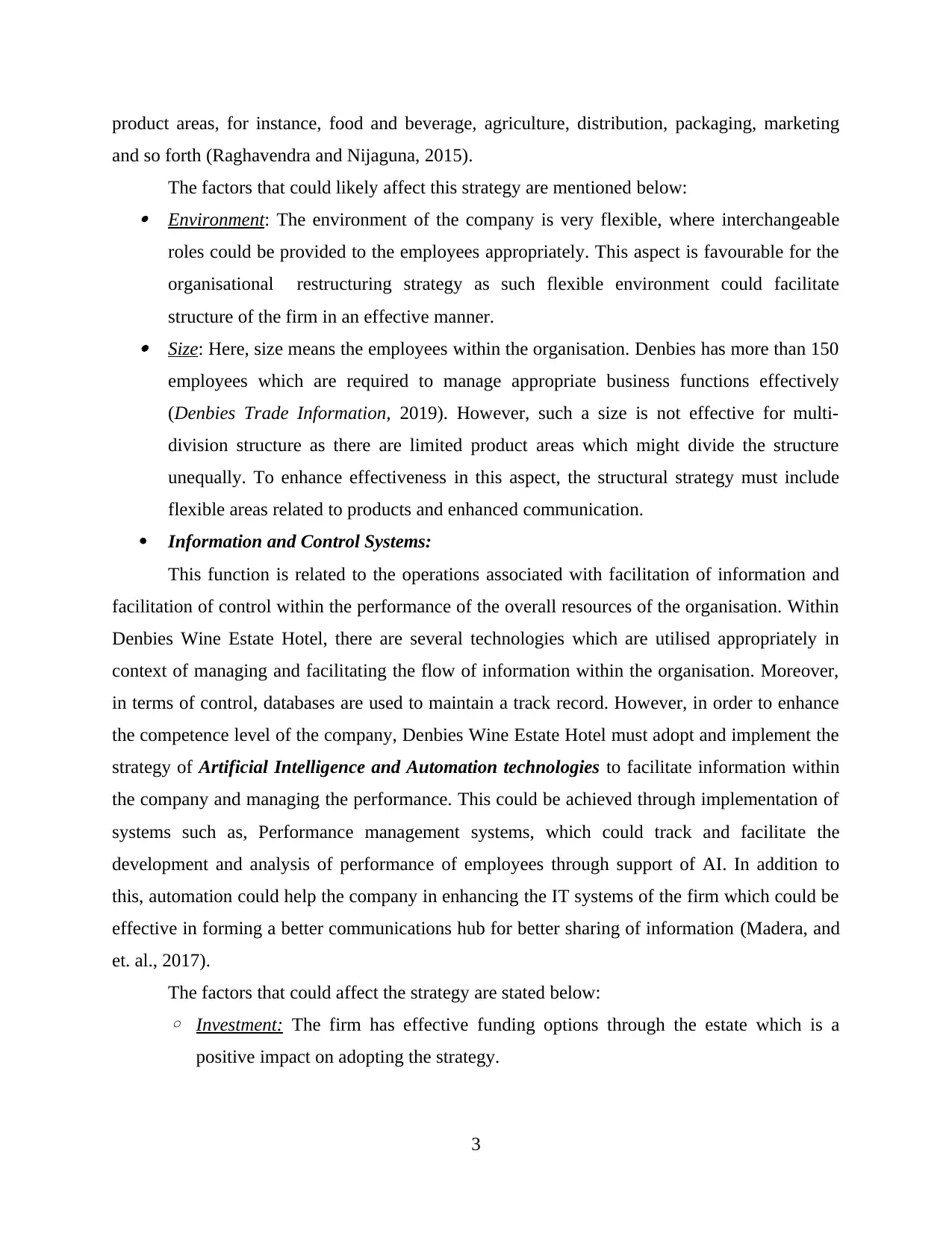
product areas, for instance, food and beverage, agriculture, distribution, packaging, marketing
and so forth (Raghavendra and Nijaguna, 2015).
The factors that could likely affect this strategy are mentioned below: Environment: The environment of the company is very flexible, where interchangeable
roles could be provided to the employees appropriately. This aspect is favourable for the
organisational restructuring strategy as such flexible environment could facilitate
structure of the firm in an effective manner. Size: Here, size means the employees within the organisation. Denbies has more than 150
employees which are required to manage appropriate business functions effectively
(Denbies Trade Information, 2019). However, such a size is not effective for multi-
division structure as there are limited product areas which might divide the structure
unequally. To enhance effectiveness in this aspect, the structural strategy must include
flexible areas related to products and enhanced communication.
Information and Control Systems:
This function is related to the operations associated with facilitation of information and
facilitation of control within the performance of the overall resources of the organisation. Within
Denbies Wine Estate Hotel, there are several technologies which are utilised appropriately in
context of managing and facilitating the flow of information within the organisation. Moreover,
in terms of control, databases are used to maintain a track record. However, in order to enhance
the competence level of the company, Denbies Wine Estate Hotel must adopt and implement the
strategy of Artificial Intelligence and Automation technologies to facilitate information within
the company and managing the performance. This could be achieved through implementation of
systems such as, Performance management systems, which could track and facilitate the
development and analysis of performance of employees through support of AI. In addition to
this, automation could help the company in enhancing the IT systems of the firm which could be
effective in forming a better communications hub for better sharing of information (Madera, and
et. al., 2017).
The factors that could affect the strategy are stated below:
◦ Investment: The firm has effective funding options through the estate which is a
positive impact on adopting the strategy.
3
and so forth (Raghavendra and Nijaguna, 2015).
The factors that could likely affect this strategy are mentioned below: Environment: The environment of the company is very flexible, where interchangeable
roles could be provided to the employees appropriately. This aspect is favourable for the
organisational restructuring strategy as such flexible environment could facilitate
structure of the firm in an effective manner. Size: Here, size means the employees within the organisation. Denbies has more than 150
employees which are required to manage appropriate business functions effectively
(Denbies Trade Information, 2019). However, such a size is not effective for multi-
division structure as there are limited product areas which might divide the structure
unequally. To enhance effectiveness in this aspect, the structural strategy must include
flexible areas related to products and enhanced communication.
Information and Control Systems:
This function is related to the operations associated with facilitation of information and
facilitation of control within the performance of the overall resources of the organisation. Within
Denbies Wine Estate Hotel, there are several technologies which are utilised appropriately in
context of managing and facilitating the flow of information within the organisation. Moreover,
in terms of control, databases are used to maintain a track record. However, in order to enhance
the competence level of the company, Denbies Wine Estate Hotel must adopt and implement the
strategy of Artificial Intelligence and Automation technologies to facilitate information within
the company and managing the performance. This could be achieved through implementation of
systems such as, Performance management systems, which could track and facilitate the
development and analysis of performance of employees through support of AI. In addition to
this, automation could help the company in enhancing the IT systems of the firm which could be
effective in forming a better communications hub for better sharing of information (Madera, and
et. al., 2017).
The factors that could affect the strategy are stated below:
◦ Investment: The firm has effective funding options through the estate which is a
positive impact on adopting the strategy.
3
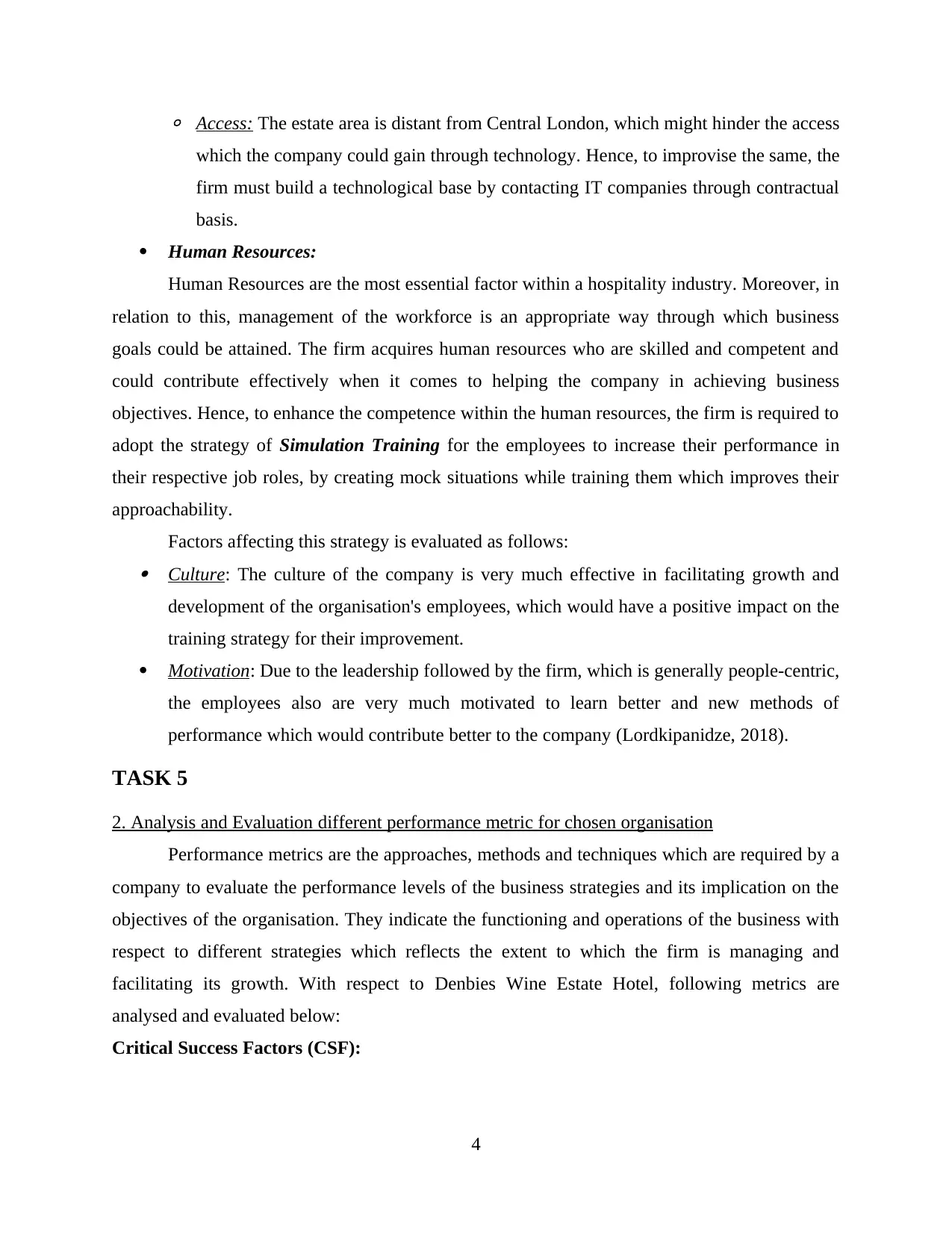
◦ Access: The estate area is distant from Central London, which might hinder the access
which the company could gain through technology. Hence, to improvise the same, the
firm must build a technological base by contacting IT companies through contractual
basis.
Human Resources:
Human Resources are the most essential factor within a hospitality industry. Moreover, in
relation to this, management of the workforce is an appropriate way through which business
goals could be attained. The firm acquires human resources who are skilled and competent and
could contribute effectively when it comes to helping the company in achieving business
objectives. Hence, to enhance the competence within the human resources, the firm is required to
adopt the strategy of Simulation Training for the employees to increase their performance in
their respective job roles, by creating mock situations while training them which improves their
approachability.
Factors affecting this strategy is evaluated as follows: Culture: The culture of the company is very much effective in facilitating growth and
development of the organisation's employees, which would have a positive impact on the
training strategy for their improvement.
Motivation: Due to the leadership followed by the firm, which is generally people-centric,
the employees also are very much motivated to learn better and new methods of
performance which would contribute better to the company (Lordkipanidze, 2018).
TASK 5
2. Analysis and Evaluation different performance metric for chosen organisation
Performance metrics are the approaches, methods and techniques which are required by a
company to evaluate the performance levels of the business strategies and its implication on the
objectives of the organisation. They indicate the functioning and operations of the business with
respect to different strategies which reflects the extent to which the firm is managing and
facilitating its growth. With respect to Denbies Wine Estate Hotel, following metrics are
analysed and evaluated below:
Critical Success Factors (CSF):
4
which the company could gain through technology. Hence, to improvise the same, the
firm must build a technological base by contacting IT companies through contractual
basis.
Human Resources:
Human Resources are the most essential factor within a hospitality industry. Moreover, in
relation to this, management of the workforce is an appropriate way through which business
goals could be attained. The firm acquires human resources who are skilled and competent and
could contribute effectively when it comes to helping the company in achieving business
objectives. Hence, to enhance the competence within the human resources, the firm is required to
adopt the strategy of Simulation Training for the employees to increase their performance in
their respective job roles, by creating mock situations while training them which improves their
approachability.
Factors affecting this strategy is evaluated as follows: Culture: The culture of the company is very much effective in facilitating growth and
development of the organisation's employees, which would have a positive impact on the
training strategy for their improvement.
Motivation: Due to the leadership followed by the firm, which is generally people-centric,
the employees also are very much motivated to learn better and new methods of
performance which would contribute better to the company (Lordkipanidze, 2018).
TASK 5
2. Analysis and Evaluation different performance metric for chosen organisation
Performance metrics are the approaches, methods and techniques which are required by a
company to evaluate the performance levels of the business strategies and its implication on the
objectives of the organisation. They indicate the functioning and operations of the business with
respect to different strategies which reflects the extent to which the firm is managing and
facilitating its growth. With respect to Denbies Wine Estate Hotel, following metrics are
analysed and evaluated below:
Critical Success Factors (CSF):
4
⊘ This is a preview!⊘
Do you want full access?
Subscribe today to unlock all pages.

Trusted by 1+ million students worldwide
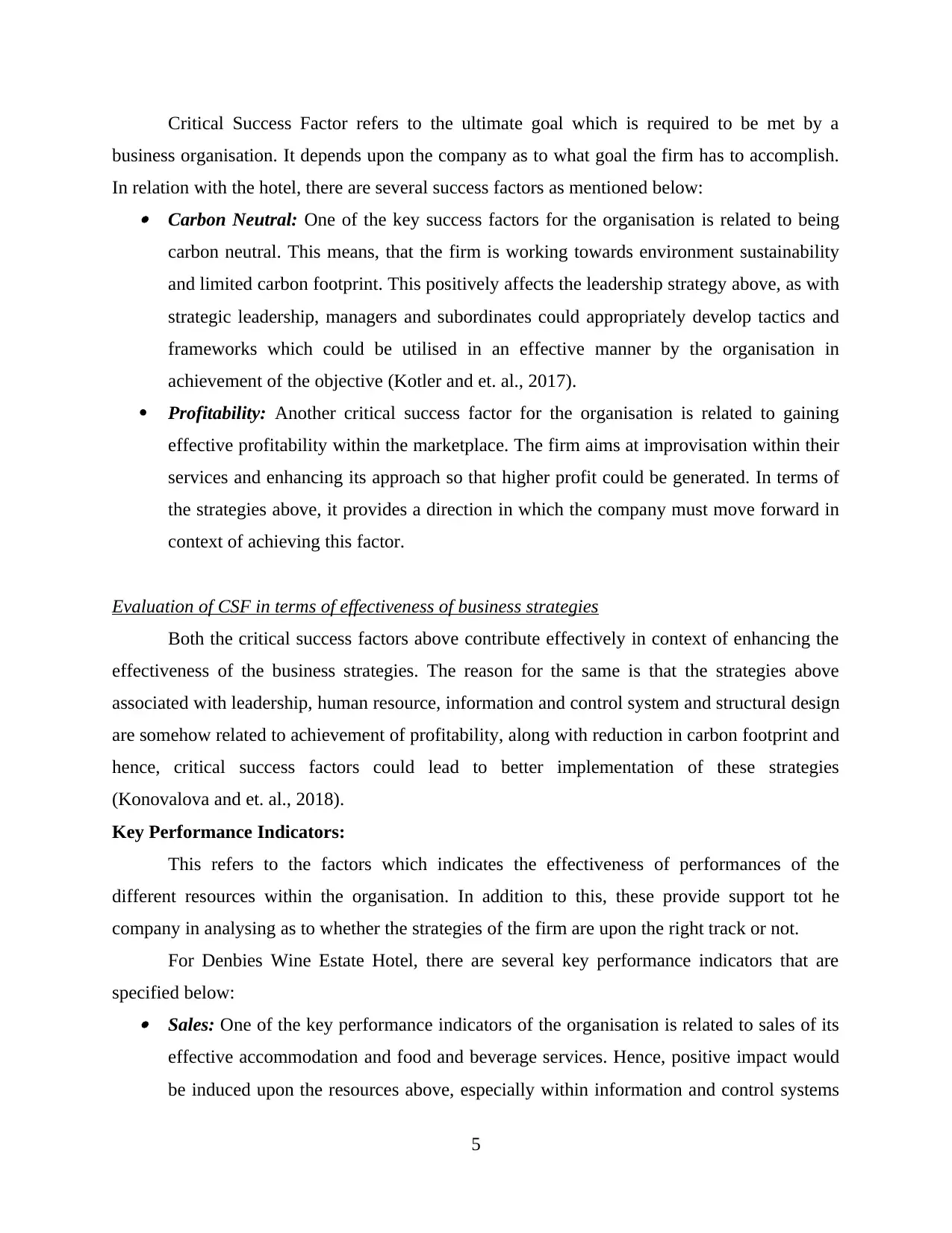
Critical Success Factor refers to the ultimate goal which is required to be met by a
business organisation. It depends upon the company as to what goal the firm has to accomplish.
In relation with the hotel, there are several success factors as mentioned below: Carbon Neutral: One of the key success factors for the organisation is related to being
carbon neutral. This means, that the firm is working towards environment sustainability
and limited carbon footprint. This positively affects the leadership strategy above, as with
strategic leadership, managers and subordinates could appropriately develop tactics and
frameworks which could be utilised in an effective manner by the organisation in
achievement of the objective (Kotler and et. al., 2017).
Profitability: Another critical success factor for the organisation is related to gaining
effective profitability within the marketplace. The firm aims at improvisation within their
services and enhancing its approach so that higher profit could be generated. In terms of
the strategies above, it provides a direction in which the company must move forward in
context of achieving this factor.
Evaluation of CSF in terms of effectiveness of business strategies
Both the critical success factors above contribute effectively in context of enhancing the
effectiveness of the business strategies. The reason for the same is that the strategies above
associated with leadership, human resource, information and control system and structural design
are somehow related to achievement of profitability, along with reduction in carbon footprint and
hence, critical success factors could lead to better implementation of these strategies
(Konovalova and et. al., 2018).
Key Performance Indicators:
This refers to the factors which indicates the effectiveness of performances of the
different resources within the organisation. In addition to this, these provide support tot he
company in analysing as to whether the strategies of the firm are upon the right track or not.
For Denbies Wine Estate Hotel, there are several key performance indicators that are
specified below: Sales: One of the key performance indicators of the organisation is related to sales of its
effective accommodation and food and beverage services. Hence, positive impact would
be induced upon the resources above, especially within information and control systems
5
business organisation. It depends upon the company as to what goal the firm has to accomplish.
In relation with the hotel, there are several success factors as mentioned below: Carbon Neutral: One of the key success factors for the organisation is related to being
carbon neutral. This means, that the firm is working towards environment sustainability
and limited carbon footprint. This positively affects the leadership strategy above, as with
strategic leadership, managers and subordinates could appropriately develop tactics and
frameworks which could be utilised in an effective manner by the organisation in
achievement of the objective (Kotler and et. al., 2017).
Profitability: Another critical success factor for the organisation is related to gaining
effective profitability within the marketplace. The firm aims at improvisation within their
services and enhancing its approach so that higher profit could be generated. In terms of
the strategies above, it provides a direction in which the company must move forward in
context of achieving this factor.
Evaluation of CSF in terms of effectiveness of business strategies
Both the critical success factors above contribute effectively in context of enhancing the
effectiveness of the business strategies. The reason for the same is that the strategies above
associated with leadership, human resource, information and control system and structural design
are somehow related to achievement of profitability, along with reduction in carbon footprint and
hence, critical success factors could lead to better implementation of these strategies
(Konovalova and et. al., 2018).
Key Performance Indicators:
This refers to the factors which indicates the effectiveness of performances of the
different resources within the organisation. In addition to this, these provide support tot he
company in analysing as to whether the strategies of the firm are upon the right track or not.
For Denbies Wine Estate Hotel, there are several key performance indicators that are
specified below: Sales: One of the key performance indicators of the organisation is related to sales of its
effective accommodation and food and beverage services. Hence, positive impact would
be induced upon the resources above, especially within information and control systems
5
Paraphrase This Document
Need a fresh take? Get an instant paraphrase of this document with our AI Paraphraser
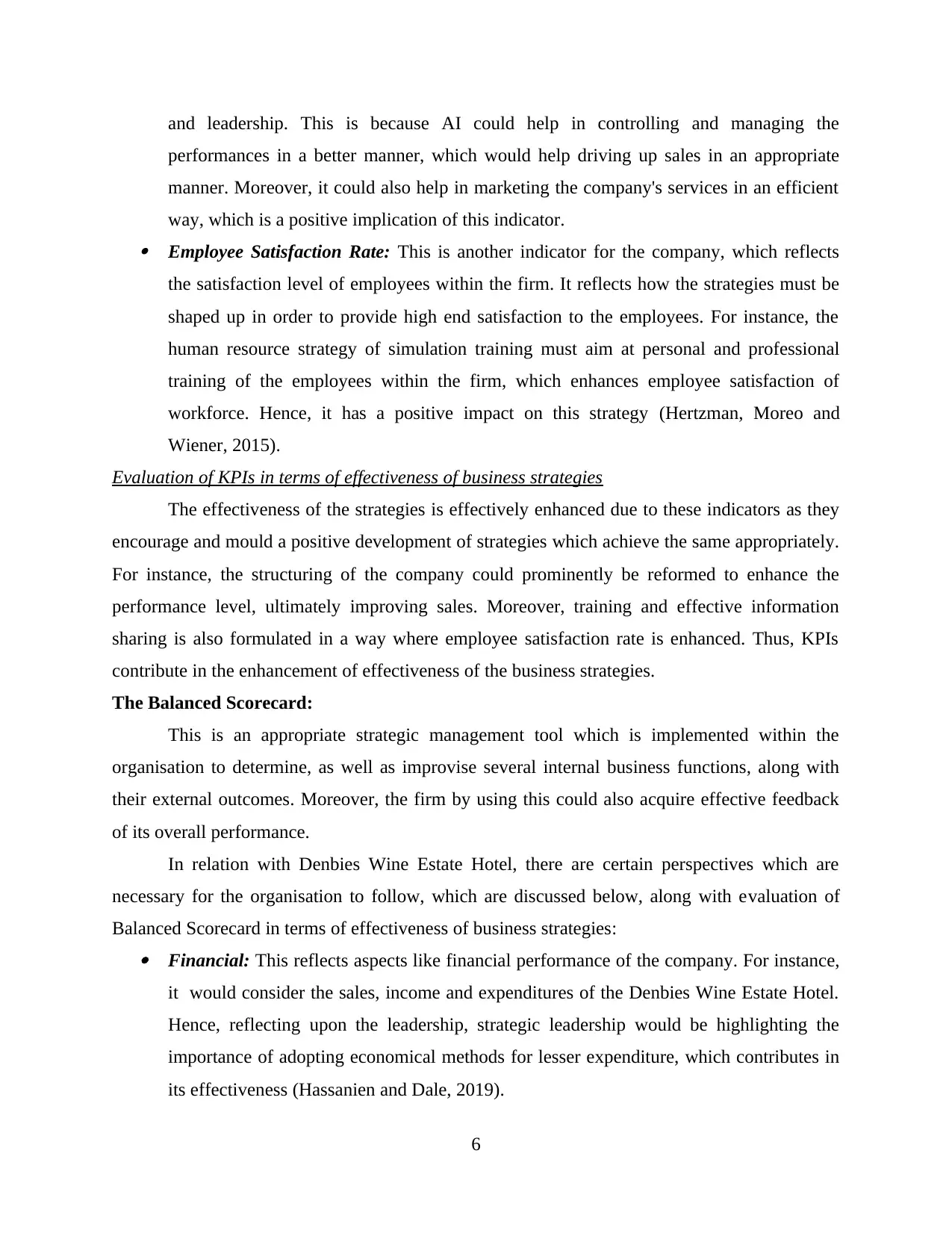
and leadership. This is because AI could help in controlling and managing the
performances in a better manner, which would help driving up sales in an appropriate
manner. Moreover, it could also help in marketing the company's services in an efficient
way, which is a positive implication of this indicator. Employee Satisfaction Rate: This is another indicator for the company, which reflects
the satisfaction level of employees within the firm. It reflects how the strategies must be
shaped up in order to provide high end satisfaction to the employees. For instance, the
human resource strategy of simulation training must aim at personal and professional
training of the employees within the firm, which enhances employee satisfaction of
workforce. Hence, it has a positive impact on this strategy (Hertzman, Moreo and
Wiener, 2015).
Evaluation of KPIs in terms of effectiveness of business strategies
The effectiveness of the strategies is effectively enhanced due to these indicators as they
encourage and mould a positive development of strategies which achieve the same appropriately.
For instance, the structuring of the company could prominently be reformed to enhance the
performance level, ultimately improving sales. Moreover, training and effective information
sharing is also formulated in a way where employee satisfaction rate is enhanced. Thus, KPIs
contribute in the enhancement of effectiveness of the business strategies.
The Balanced Scorecard:
This is an appropriate strategic management tool which is implemented within the
organisation to determine, as well as improvise several internal business functions, along with
their external outcomes. Moreover, the firm by using this could also acquire effective feedback
of its overall performance.
In relation with Denbies Wine Estate Hotel, there are certain perspectives which are
necessary for the organisation to follow, which are discussed below, along with evaluation of
Balanced Scorecard in terms of effectiveness of business strategies: Financial: This reflects aspects like financial performance of the company. For instance,
it would consider the sales, income and expenditures of the Denbies Wine Estate Hotel.
Hence, reflecting upon the leadership, strategic leadership would be highlighting the
importance of adopting economical methods for lesser expenditure, which contributes in
its effectiveness (Hassanien and Dale, 2019).
6
performances in a better manner, which would help driving up sales in an appropriate
manner. Moreover, it could also help in marketing the company's services in an efficient
way, which is a positive implication of this indicator. Employee Satisfaction Rate: This is another indicator for the company, which reflects
the satisfaction level of employees within the firm. It reflects how the strategies must be
shaped up in order to provide high end satisfaction to the employees. For instance, the
human resource strategy of simulation training must aim at personal and professional
training of the employees within the firm, which enhances employee satisfaction of
workforce. Hence, it has a positive impact on this strategy (Hertzman, Moreo and
Wiener, 2015).
Evaluation of KPIs in terms of effectiveness of business strategies
The effectiveness of the strategies is effectively enhanced due to these indicators as they
encourage and mould a positive development of strategies which achieve the same appropriately.
For instance, the structuring of the company could prominently be reformed to enhance the
performance level, ultimately improving sales. Moreover, training and effective information
sharing is also formulated in a way where employee satisfaction rate is enhanced. Thus, KPIs
contribute in the enhancement of effectiveness of the business strategies.
The Balanced Scorecard:
This is an appropriate strategic management tool which is implemented within the
organisation to determine, as well as improvise several internal business functions, along with
their external outcomes. Moreover, the firm by using this could also acquire effective feedback
of its overall performance.
In relation with Denbies Wine Estate Hotel, there are certain perspectives which are
necessary for the organisation to follow, which are discussed below, along with evaluation of
Balanced Scorecard in terms of effectiveness of business strategies: Financial: This reflects aspects like financial performance of the company. For instance,
it would consider the sales, income and expenditures of the Denbies Wine Estate Hotel.
Hence, reflecting upon the leadership, strategic leadership would be highlighting the
importance of adopting economical methods for lesser expenditure, which contributes in
its effectiveness (Hassanien and Dale, 2019).
6
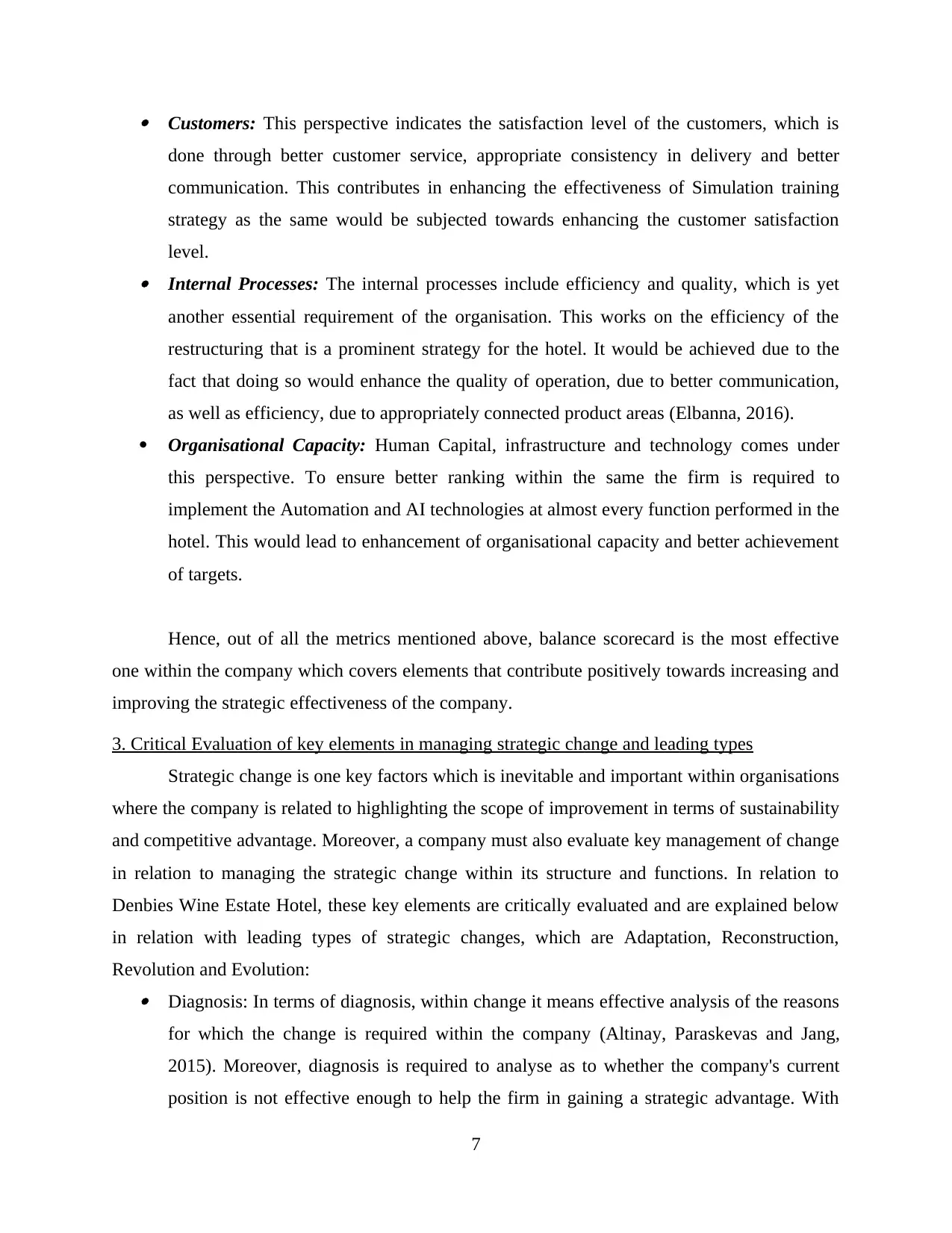
Customers: This perspective indicates the satisfaction level of the customers, which is
done through better customer service, appropriate consistency in delivery and better
communication. This contributes in enhancing the effectiveness of Simulation training
strategy as the same would be subjected towards enhancing the customer satisfaction
level. Internal Processes: The internal processes include efficiency and quality, which is yet
another essential requirement of the organisation. This works on the efficiency of the
restructuring that is a prominent strategy for the hotel. It would be achieved due to the
fact that doing so would enhance the quality of operation, due to better communication,
as well as efficiency, due to appropriately connected product areas (Elbanna, 2016).
Organisational Capacity: Human Capital, infrastructure and technology comes under
this perspective. To ensure better ranking within the same the firm is required to
implement the Automation and AI technologies at almost every function performed in the
hotel. This would lead to enhancement of organisational capacity and better achievement
of targets.
Hence, out of all the metrics mentioned above, balance scorecard is the most effective
one within the company which covers elements that contribute positively towards increasing and
improving the strategic effectiveness of the company.
3. Critical Evaluation of key elements in managing strategic change and leading types
Strategic change is one key factors which is inevitable and important within organisations
where the company is related to highlighting the scope of improvement in terms of sustainability
and competitive advantage. Moreover, a company must also evaluate key management of change
in relation to managing the strategic change within its structure and functions. In relation to
Denbies Wine Estate Hotel, these key elements are critically evaluated and are explained below
in relation with leading types of strategic changes, which are Adaptation, Reconstruction,
Revolution and Evolution: Diagnosis: In terms of diagnosis, within change it means effective analysis of the reasons
for which the change is required within the company (Altinay, Paraskevas and Jang,
2015). Moreover, diagnosis is required to analyse as to whether the company's current
position is not effective enough to help the firm in gaining a strategic advantage. With
7
done through better customer service, appropriate consistency in delivery and better
communication. This contributes in enhancing the effectiveness of Simulation training
strategy as the same would be subjected towards enhancing the customer satisfaction
level. Internal Processes: The internal processes include efficiency and quality, which is yet
another essential requirement of the organisation. This works on the efficiency of the
restructuring that is a prominent strategy for the hotel. It would be achieved due to the
fact that doing so would enhance the quality of operation, due to better communication,
as well as efficiency, due to appropriately connected product areas (Elbanna, 2016).
Organisational Capacity: Human Capital, infrastructure and technology comes under
this perspective. To ensure better ranking within the same the firm is required to
implement the Automation and AI technologies at almost every function performed in the
hotel. This would lead to enhancement of organisational capacity and better achievement
of targets.
Hence, out of all the metrics mentioned above, balance scorecard is the most effective
one within the company which covers elements that contribute positively towards increasing and
improving the strategic effectiveness of the company.
3. Critical Evaluation of key elements in managing strategic change and leading types
Strategic change is one key factors which is inevitable and important within organisations
where the company is related to highlighting the scope of improvement in terms of sustainability
and competitive advantage. Moreover, a company must also evaluate key management of change
in relation to managing the strategic change within its structure and functions. In relation to
Denbies Wine Estate Hotel, these key elements are critically evaluated and are explained below
in relation with leading types of strategic changes, which are Adaptation, Reconstruction,
Revolution and Evolution: Diagnosis: In terms of diagnosis, within change it means effective analysis of the reasons
for which the change is required within the company (Altinay, Paraskevas and Jang,
2015). Moreover, diagnosis is required to analyse as to whether the company's current
position is not effective enough to help the firm in gaining a strategic advantage. With
7
⊘ This is a preview!⊘
Do you want full access?
Subscribe today to unlock all pages.

Trusted by 1+ million students worldwide
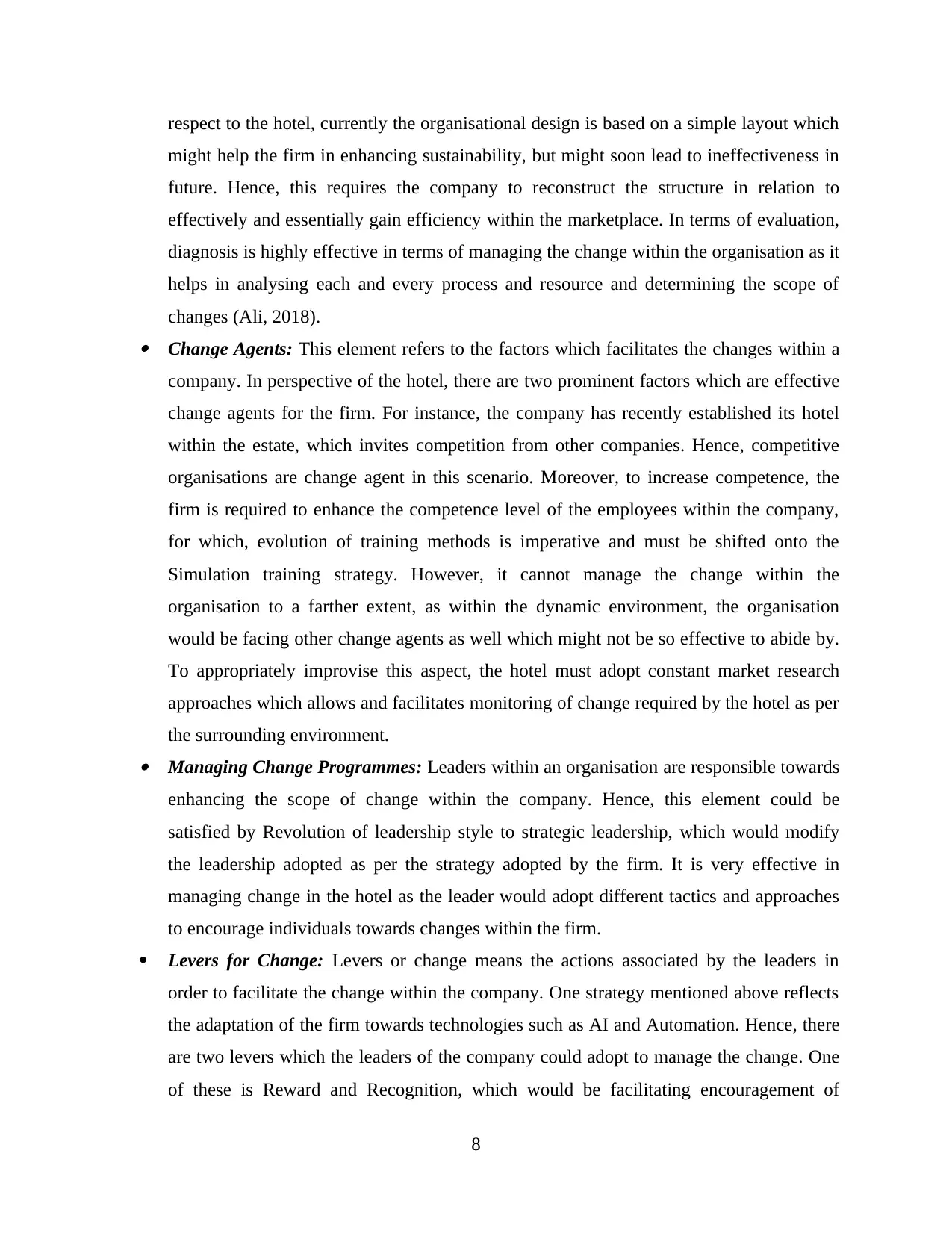
respect to the hotel, currently the organisational design is based on a simple layout which
might help the firm in enhancing sustainability, but might soon lead to ineffectiveness in
future. Hence, this requires the company to reconstruct the structure in relation to
effectively and essentially gain efficiency within the marketplace. In terms of evaluation,
diagnosis is highly effective in terms of managing the change within the organisation as it
helps in analysing each and every process and resource and determining the scope of
changes (Ali, 2018). Change Agents: This element refers to the factors which facilitates the changes within a
company. In perspective of the hotel, there are two prominent factors which are effective
change agents for the firm. For instance, the company has recently established its hotel
within the estate, which invites competition from other companies. Hence, competitive
organisations are change agent in this scenario. Moreover, to increase competence, the
firm is required to enhance the competence level of the employees within the company,
for which, evolution of training methods is imperative and must be shifted onto the
Simulation training strategy. However, it cannot manage the change within the
organisation to a farther extent, as within the dynamic environment, the organisation
would be facing other change agents as well which might not be so effective to abide by.
To appropriately improvise this aspect, the hotel must adopt constant market research
approaches which allows and facilitates monitoring of change required by the hotel as per
the surrounding environment. Managing Change Programmes: Leaders within an organisation are responsible towards
enhancing the scope of change within the company. Hence, this element could be
satisfied by Revolution of leadership style to strategic leadership, which would modify
the leadership adopted as per the strategy adopted by the firm. It is very effective in
managing change in the hotel as the leader would adopt different tactics and approaches
to encourage individuals towards changes within the firm.
Levers for Change: Levers or change means the actions associated by the leaders in
order to facilitate the change within the company. One strategy mentioned above reflects
the adaptation of the firm towards technologies such as AI and Automation. Hence, there
are two levers which the leaders of the company could adopt to manage the change. One
of these is Reward and Recognition, which would be facilitating encouragement of
8
might help the firm in enhancing sustainability, but might soon lead to ineffectiveness in
future. Hence, this requires the company to reconstruct the structure in relation to
effectively and essentially gain efficiency within the marketplace. In terms of evaluation,
diagnosis is highly effective in terms of managing the change within the organisation as it
helps in analysing each and every process and resource and determining the scope of
changes (Ali, 2018). Change Agents: This element refers to the factors which facilitates the changes within a
company. In perspective of the hotel, there are two prominent factors which are effective
change agents for the firm. For instance, the company has recently established its hotel
within the estate, which invites competition from other companies. Hence, competitive
organisations are change agent in this scenario. Moreover, to increase competence, the
firm is required to enhance the competence level of the employees within the company,
for which, evolution of training methods is imperative and must be shifted onto the
Simulation training strategy. However, it cannot manage the change within the
organisation to a farther extent, as within the dynamic environment, the organisation
would be facing other change agents as well which might not be so effective to abide by.
To appropriately improvise this aspect, the hotel must adopt constant market research
approaches which allows and facilitates monitoring of change required by the hotel as per
the surrounding environment. Managing Change Programmes: Leaders within an organisation are responsible towards
enhancing the scope of change within the company. Hence, this element could be
satisfied by Revolution of leadership style to strategic leadership, which would modify
the leadership adopted as per the strategy adopted by the firm. It is very effective in
managing change in the hotel as the leader would adopt different tactics and approaches
to encourage individuals towards changes within the firm.
Levers for Change: Levers or change means the actions associated by the leaders in
order to facilitate the change within the company. One strategy mentioned above reflects
the adaptation of the firm towards technologies such as AI and Automation. Hence, there
are two levers which the leaders of the company could adopt to manage the change. One
of these is Reward and Recognition, which would be facilitating encouragement of
8
Paraphrase This Document
Need a fresh take? Get an instant paraphrase of this document with our AI Paraphraser
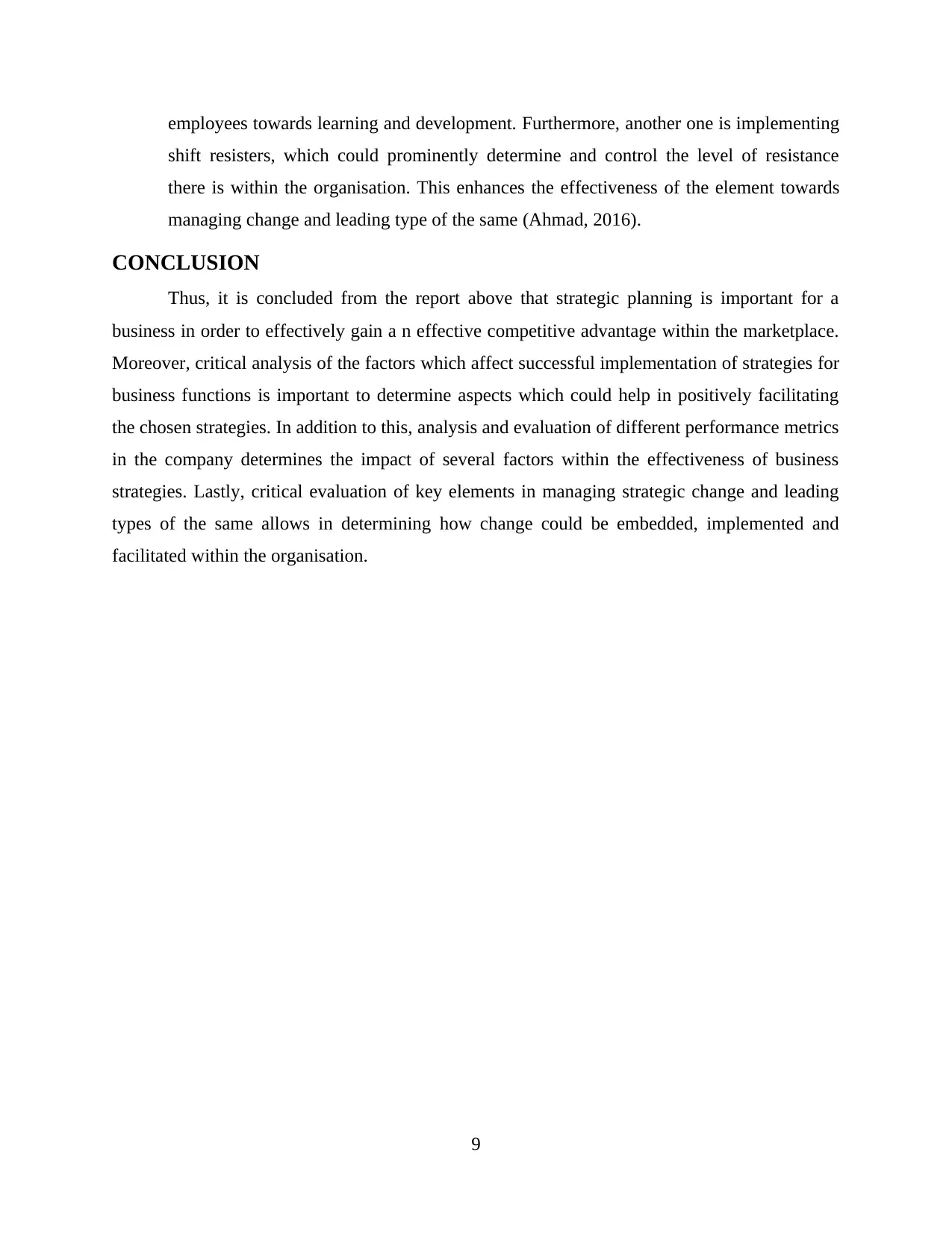
employees towards learning and development. Furthermore, another one is implementing
shift resisters, which could prominently determine and control the level of resistance
there is within the organisation. This enhances the effectiveness of the element towards
managing change and leading type of the same (Ahmad, 2016).
CONCLUSION
Thus, it is concluded from the report above that strategic planning is important for a
business in order to effectively gain a n effective competitive advantage within the marketplace.
Moreover, critical analysis of the factors which affect successful implementation of strategies for
business functions is important to determine aspects which could help in positively facilitating
the chosen strategies. In addition to this, analysis and evaluation of different performance metrics
in the company determines the impact of several factors within the effectiveness of business
strategies. Lastly, critical evaluation of key elements in managing strategic change and leading
types of the same allows in determining how change could be embedded, implemented and
facilitated within the organisation.
9
shift resisters, which could prominently determine and control the level of resistance
there is within the organisation. This enhances the effectiveness of the element towards
managing change and leading type of the same (Ahmad, 2016).
CONCLUSION
Thus, it is concluded from the report above that strategic planning is important for a
business in order to effectively gain a n effective competitive advantage within the marketplace.
Moreover, critical analysis of the factors which affect successful implementation of strategies for
business functions is important to determine aspects which could help in positively facilitating
the chosen strategies. In addition to this, analysis and evaluation of different performance metrics
in the company determines the impact of several factors within the effectiveness of business
strategies. Lastly, critical evaluation of key elements in managing strategic change and leading
types of the same allows in determining how change could be embedded, implemented and
facilitated within the organisation.
9
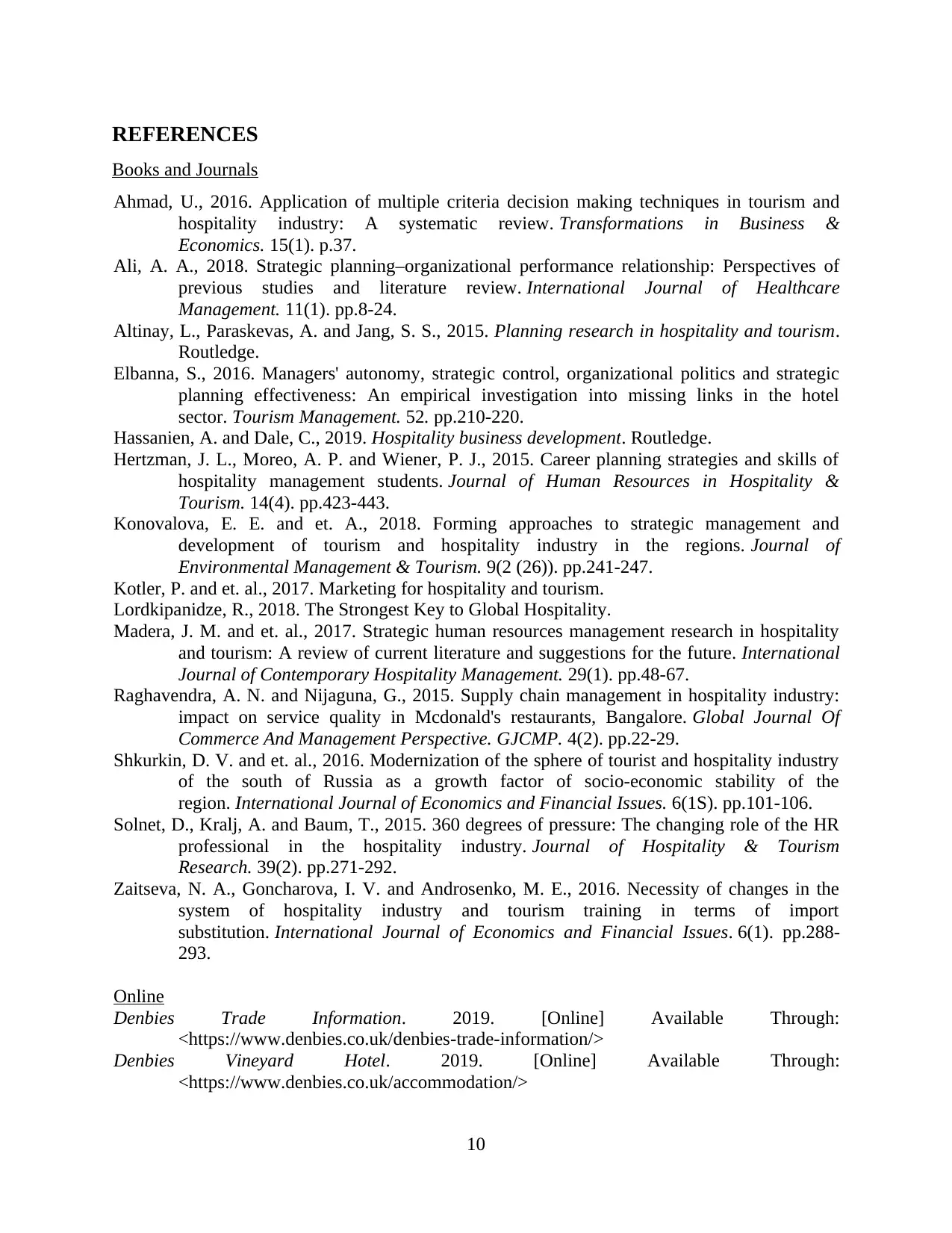
REFERENCES
Books and Journals
Ahmad, U., 2016. Application of multiple criteria decision making techniques in tourism and
hospitality industry: A systematic review. Transformations in Business &
Economics. 15(1). p.37.
Ali, A. A., 2018. Strategic planning–organizational performance relationship: Perspectives of
previous studies and literature review. International Journal of Healthcare
Management. 11(1). pp.8-24.
Altinay, L., Paraskevas, A. and Jang, S. S., 2015. Planning research in hospitality and tourism.
Routledge.
Elbanna, S., 2016. Managers' autonomy, strategic control, organizational politics and strategic
planning effectiveness: An empirical investigation into missing links in the hotel
sector. Tourism Management. 52. pp.210-220.
Hassanien, A. and Dale, C., 2019. Hospitality business development. Routledge.
Hertzman, J. L., Moreo, A. P. and Wiener, P. J., 2015. Career planning strategies and skills of
hospitality management students. Journal of Human Resources in Hospitality &
Tourism. 14(4). pp.423-443.
Konovalova, E. E. and et. A., 2018. Forming approaches to strategic management and
development of tourism and hospitality industry in the regions. Journal of
Environmental Management & Tourism. 9(2 (26)). pp.241-247.
Kotler, P. and et. al., 2017. Marketing for hospitality and tourism.
Lordkipanidze, R., 2018. The Strongest Key to Global Hospitality.
Madera, J. M. and et. al., 2017. Strategic human resources management research in hospitality
and tourism: A review of current literature and suggestions for the future. International
Journal of Contemporary Hospitality Management. 29(1). pp.48-67.
Raghavendra, A. N. and Nijaguna, G., 2015. Supply chain management in hospitality industry:
impact on service quality in Mcdonald's restaurants, Bangalore. Global Journal Of
Commerce And Management Perspective. GJCMP. 4(2). pp.22-29.
Shkurkin, D. V. and et. al., 2016. Modernization of the sphere of tourist and hospitality industry
of the south of Russia as a growth factor of socio-economic stability of the
region. International Journal of Economics and Financial Issues. 6(1S). pp.101-106.
Solnet, D., Kralj, A. and Baum, T., 2015. 360 degrees of pressure: The changing role of the HR
professional in the hospitality industry. Journal of Hospitality & Tourism
Research. 39(2). pp.271-292.
Zaitseva, N. A., Goncharova, I. V. and Androsenko, M. E., 2016. Necessity of changes in the
system of hospitality industry and tourism training in terms of import
substitution. International Journal of Economics and Financial Issues. 6(1). pp.288-
293.
Online
Denbies Trade Information. 2019. [Online] Available Through:
<https://www.denbies.co.uk/denbies-trade-information/>
Denbies Vineyard Hotel. 2019. [Online] Available Through:
<https://www.denbies.co.uk/accommodation/>
10
Books and Journals
Ahmad, U., 2016. Application of multiple criteria decision making techniques in tourism and
hospitality industry: A systematic review. Transformations in Business &
Economics. 15(1). p.37.
Ali, A. A., 2018. Strategic planning–organizational performance relationship: Perspectives of
previous studies and literature review. International Journal of Healthcare
Management. 11(1). pp.8-24.
Altinay, L., Paraskevas, A. and Jang, S. S., 2015. Planning research in hospitality and tourism.
Routledge.
Elbanna, S., 2016. Managers' autonomy, strategic control, organizational politics and strategic
planning effectiveness: An empirical investigation into missing links in the hotel
sector. Tourism Management. 52. pp.210-220.
Hassanien, A. and Dale, C., 2019. Hospitality business development. Routledge.
Hertzman, J. L., Moreo, A. P. and Wiener, P. J., 2015. Career planning strategies and skills of
hospitality management students. Journal of Human Resources in Hospitality &
Tourism. 14(4). pp.423-443.
Konovalova, E. E. and et. A., 2018. Forming approaches to strategic management and
development of tourism and hospitality industry in the regions. Journal of
Environmental Management & Tourism. 9(2 (26)). pp.241-247.
Kotler, P. and et. al., 2017. Marketing for hospitality and tourism.
Lordkipanidze, R., 2018. The Strongest Key to Global Hospitality.
Madera, J. M. and et. al., 2017. Strategic human resources management research in hospitality
and tourism: A review of current literature and suggestions for the future. International
Journal of Contemporary Hospitality Management. 29(1). pp.48-67.
Raghavendra, A. N. and Nijaguna, G., 2015. Supply chain management in hospitality industry:
impact on service quality in Mcdonald's restaurants, Bangalore. Global Journal Of
Commerce And Management Perspective. GJCMP. 4(2). pp.22-29.
Shkurkin, D. V. and et. al., 2016. Modernization of the sphere of tourist and hospitality industry
of the south of Russia as a growth factor of socio-economic stability of the
region. International Journal of Economics and Financial Issues. 6(1S). pp.101-106.
Solnet, D., Kralj, A. and Baum, T., 2015. 360 degrees of pressure: The changing role of the HR
professional in the hospitality industry. Journal of Hospitality & Tourism
Research. 39(2). pp.271-292.
Zaitseva, N. A., Goncharova, I. V. and Androsenko, M. E., 2016. Necessity of changes in the
system of hospitality industry and tourism training in terms of import
substitution. International Journal of Economics and Financial Issues. 6(1). pp.288-
293.
Online
Denbies Trade Information. 2019. [Online] Available Through:
<https://www.denbies.co.uk/denbies-trade-information/>
Denbies Vineyard Hotel. 2019. [Online] Available Through:
<https://www.denbies.co.uk/accommodation/>
10
⊘ This is a preview!⊘
Do you want full access?
Subscribe today to unlock all pages.

Trusted by 1+ million students worldwide
1 out of 13
Related Documents
Your All-in-One AI-Powered Toolkit for Academic Success.
+13062052269
info@desklib.com
Available 24*7 on WhatsApp / Email
![[object Object]](/_next/static/media/star-bottom.7253800d.svg)
Unlock your academic potential
Copyright © 2020–2026 A2Z Services. All Rights Reserved. Developed and managed by ZUCOL.





